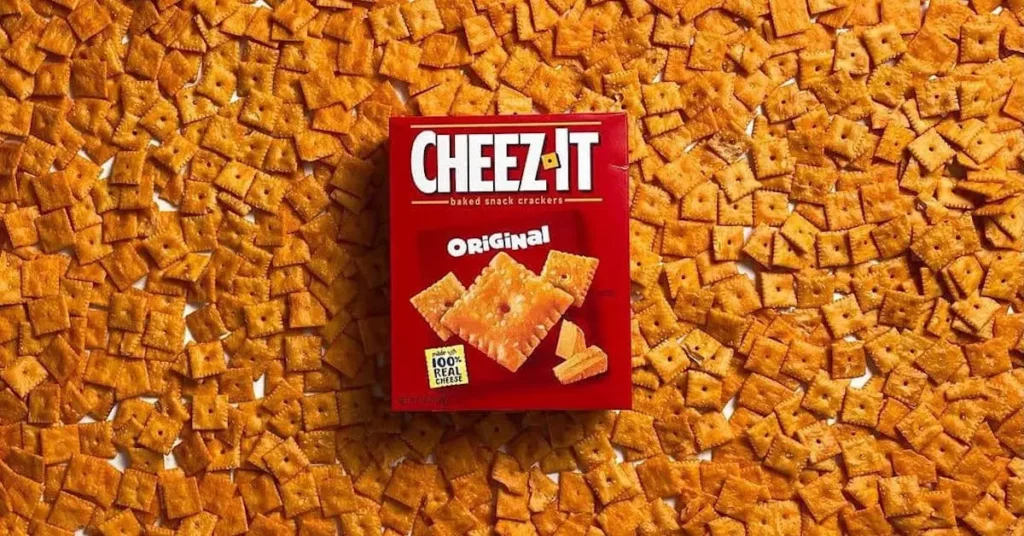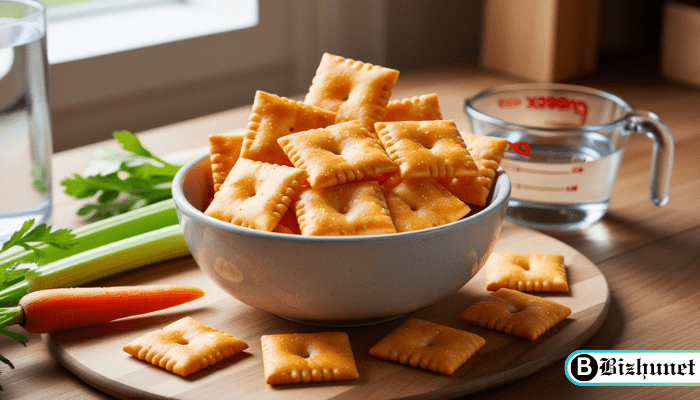Cheez-It crackers are one of the most popular snack choices for people of all ages. These small, square-shaped crackers are known for their cheesy flavor, crispy texture, and versatility. Whether eaten on their own or paired with dips, they’ve become a go-to snack for many households.
But how healthy are Cheez-It crackers? While they may be delicious and convenient, it’s essential to take a closer look at their ingredients, nutrition, and health implications. This article explores whether Cheez-It crackers are a good fit for a balanced diet, helping you make informed decisions about your snack choices.
What Are Cheez-It Crackers?
Cheez-It crackers have been a household favorite for decades. They were first introduced in 1921 by the Green and Green Company and have since become a staple snack for many. Currently, they are manufactured by Kellogg’s and remain one of the most iconic cheesy snacks in the United States.
Over the years, the brand has expanded its lineup to include various flavors and styles to cater to different tastes. Popular varieties include the classic Original Cheez-It, White Cheddar, Extra Toasty, Reduced Fat, and Cheez-It Grooves. With such a wide range of options, Cheez-It crackers appeal to snack lovers everywhere.

Nutritional Profile of Cheez-It Crackers
To determine whether Cheez-It crackers are healthy, it’s important to examine their nutritional profile.
Serving Size and Calorie Content
A standard serving size of Cheez-It crackers is about 28 grams (approximately 27 crackers). This serving provides roughly 150 calories, making them a calorie-dense snack.
Macronutrient Breakdown
- Total Fat: Around 8 grams per serving, including 2 grams of saturated fat. Most varieties do not contain trans fats, but it’s always good to check the label.
- Carbohydrates: Approximately 17 grams per serving, with little to no dietary fiber and less than 1 gram of sugar. These are primarily refined carbs.
- Protein: A serving provides about 2 grams of protein, which is relatively low.
Micronutrient Content
- Sodium: Cheez-It crackers contain about 230 milligrams of sodium per serving, which accounts for 10% of the recommended daily limit for most adults.
- Vitamins and Minerals: They contain minimal essential nutrients. While enriched flour adds small amounts of iron or folic acid, these crackers are not a significant source of vitamins or minerals.
Ingredients Analysis
Cheez-It crackers derive their flavor and texture from a specific combination of ingredients.
Primary Ingredients
Cheez-It crackers are made using enriched flour, cheese made with skim milk, vegetable oils (like soybean or palm oil), salt, and seasonings.
Enriched Flour
The use of enriched flour contributes to their refined carbohydrate content. This type of flour lacks the natural fiber and nutrients found in whole grains and has a high glycemic index, which can cause blood sugar spikes.
Oils and Fats
Palm oil and soybean oil are the primary fats used. Palm oil contributes to the cracker’s texture but contains saturated fats, which may impact heart health if consumed excessively.
Additives and Preservatives
Cheez-It crackers include additives like annatto for coloring and preservatives to extend shelf life. While generally safe, consuming such additives in large quantities may not be ideal for long-term health.
Health Considerations

Calorie Density and Weight Management
At 150 calories per serving, Cheez-It crackers are calorie-dense. Consuming them in excess can lead to weight gain, especially since they lack satiating components like protein and fiber.
Sodium Content and Cardiovascular Health
The 230 milligrams of sodium per serving is significant for a small snack. High sodium intake is linked to increased blood pressure and a greater risk of cardiovascular diseases.
Fat Content and Heart Health
With 2 grams of saturated fat per serving, frequent consumption may contribute to elevated cholesterol levels. While most varieties do not contain trans fats, it’s important to verify by reading the label.
Refined Carbohydrates and Blood Sugar Levels
The high glycemic index of Cheez-It crackers can lead to rapid blood sugar spikes. This makes them less ideal for individuals with diabetes or insulin resistance.
Comparisons with Other Snack Options
Cheez-It Crackers vs. Whole-Grain Crackers
Whole-grain crackers typically provide more fiber and fewer refined carbs, making them a healthier choice for sustained energy.
Cheez-It Crackers vs. Vegetable-Based Snacks
Vegetable-based snacks, such as baked veggie chips or roasted chickpeas, are lower in sodium and higher in essential nutrients like vitamins and fiber.
Cheez-It Crackers vs. Homemade Snacks
Homemade snacks like whole-grain crackers or cheese slices offer better control over ingredients and portion sizes, allowing for healthier customization.
Moderation and Portion Control
Serving Sizes
Sticking to the recommended serving size of 28 grams helps prevent overconsumption of calories and sodium.
Tips for Balanced Consumption
Pair Cheez-It crackers with protein-rich foods like hummus or cheese to increase satiety. Adding fresh fruits or vegetables can also provide additional nutrients and fiber.
Healthier Alternatives and Recommendations
Low-Sodium or Whole-Grain Options
Opt for Cheez-It varieties labeled as “Reduced Sodium” or “Whole Grain” for slightly better nutritional value.
Better Snack Choices
Consider air-popped popcorn, roasted nuts, or baked veggie chips as alternatives that offer improved nutrition.
Reading Labels
Always review the nutrition label for calorie, sodium, and fat content to ensure the snack aligns with your dietary goals.
Conclusion
Cheez-It crackers are a tasty and convenient snack but fall short in nutritional value. High in sodium, refined carbs, and calories, they offer minimal protein, fiber, and other essential nutrients. While they can be enjoyed occasionally as part of a balanced diet, moderation and pairing with healthier options are key. Making informed snack choices and incorporating nutrient-dense foods will support better health and wellness.
FAQs
Are Cheez-It crackers good for weight loss?
Cheez-It crackers are calorie-dense and low in protein and fiber, making them less ideal for weight loss if consumed frequently or in large portions.
Do Cheez-It crackers contain trans fats?
Most Cheez-It varieties do not contain trans fats, but it’s always advisable to check the label to confirm.
Are there healthier versions of Cheez-It crackers?
Yes, options like “Reduced Sodium” or “Whole Grain” Cheez-It crackers are available, offering slightly better nutritional profiles.
Can diabetics eat Cheez-It crackers?
Cheez-It crackers are high in refined carbs and may cause blood sugar spikes, so diabetics should consume them sparingly and with caution.
What’s the best way to include Cheez-It crackers in a diet?
Pair them with nutrient-dense foods like fresh veggies, hummus, or low-fat cheese to enhance their nutritional value and maintain balance.

